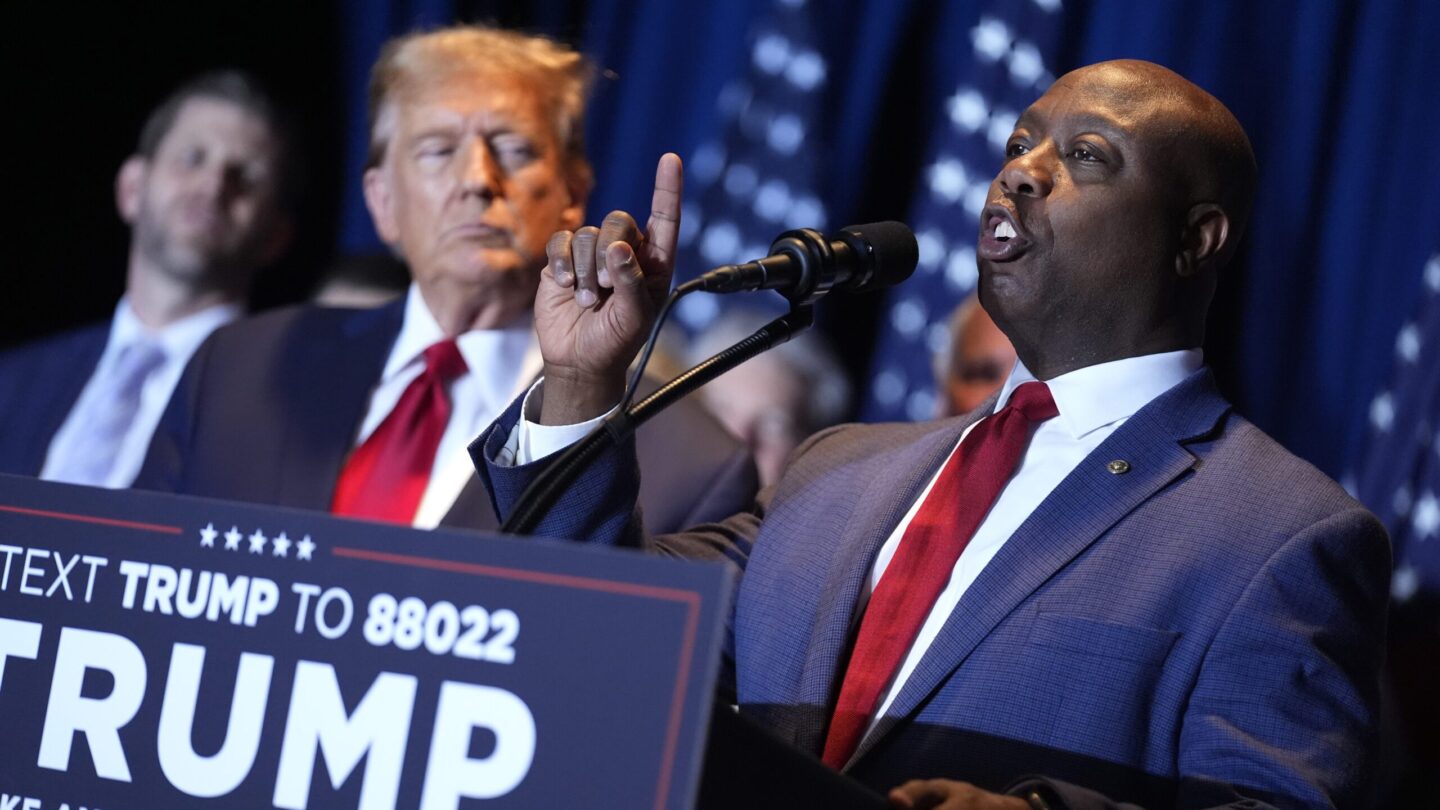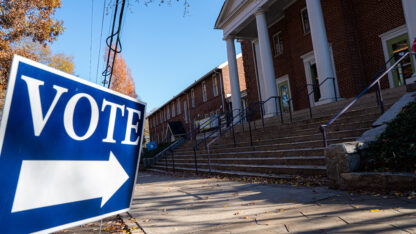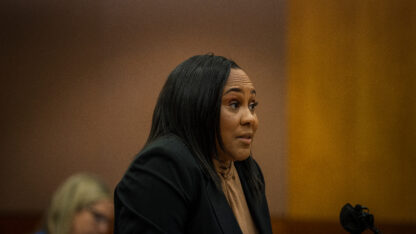Sen. Tim Scott launches $14 million outreach effort to minority voters in Georgia and other swing states

A top ally and potential running mate of former President Donald Trump is launching a new effort to win over Black and other nonwhite working class voters he argues could be the deciding factor in November’s elections.
South Carolina Sen. Tim Scott, the only Black Republican in the Senate, will lead a $14 million campaign targeting minority voters in seven key swing states including Georgia.
Scott’s push comes as Trump’s campaign is ramping up its own outreach efforts to Hispanic and Black voters, especially Black men, in his expected rematch against President Joe Biden. And it gives Scott, one of several Republicans being vetted for vice president, another platform to demonstrate his loyalty — and utility — to the presumptive GOP nominee.
Scott says that, with Trump atop the ticket, he believes Republicans have a unique opportunity to chip into Democrats’ historic dominance with minority voters. Polls show many Black and other nonwhite adults are dissatisfied with Biden’s performance, though Trump could have an uphill battle winning them over given his own unpopularity with those groups.
“Much to the chagrin of many folks, there’s no doubt that African American men are wide open for a political shift of partisanship,” Scott said as he briefed reporters on the effort in Washington this week.
The new campaign will be run by Scott’s Great Opportunity PAC, which was formed after he suspended his campaign for the GOP nomination last year. Aides say the group will work to win over more than 1 million potential voters it has identified in Georgia, North Carolina, Arizona, Wisconsin, Michigan, Nevada and Pennsylvania.
The campaign will include canvassing, digital advertising, direct mail, events and appearances by Scott and other elected officials in minority communities that Scott said Republicans have too often avoided.
While it remains separate from Trump’s campaign, aides said Scott recently met with Republican National Committee Chairman Michael Whatley and Co-Chair Lara Trump to brief them on his plans.
“We will fight for and earn the vote of Black and brown voters and in doing so help Donald J. Trump win the Presidency and Republicans win back the House and Senate,” reads a memo from Jennifer DeCasper, who managed Scott’s 2024 campaign.
Trump has held a number of events in recent weeks aimed at those groups, including a rally in New York’s South Bronx and a dinner Wednesday evening with students and alumni from historically Black colleges and universities at his Mar-a-Lago club in Palm Beach, Florida.
At the same time, national Democrats are investing heavily in stopping Trump from making inroads with a core constituency. Biden and Vice President Kamala Harris, the first Black vice president, last week launched a Black voter outreach campaign by pointing to their efforts to boost funding for those schools, forgive federal student loan debt and pardon those sentenced for simple marijuana possession.
Biden also accused Trump at the event of sowing “anger, resentment and hate” and pointed to Trump’s history of controversies around race, from his real estate business being sued for allegedly discriminating against Black renters to his comments after the death of George Floyd, a Black man killed by police.
Scott’s group believes a fundamental realignment is underway. It notes that Trump in 2016 won large swaths of white working class voters who had once formed the heart of Democrats’ Rust Belt base.
Now, it says it sees signs of a broader shift in which more nonwhite working class voters could turn to Trump, too.
Even a small shift of only a few percentage points with minority voters could make the difference in what is expected to be an exceptionally close election that will be decided in a handful of battleground states.
Many Black and Hispanic adults are indeed dissatisfied with Biden’s performance as president.
According to surveys by The Associated Press-NORC Center for Public Affairs Research, Biden’s approval among Black adults has dropped from 94% when he took office to 55% in March. Among Hispanic adults, it dropped from 70% to 32% over the same period.
But a February AP-NORC poll found only about one-quarter of Black adults had a favorable view of Trump, which could make it harder for him to capitalize on Biden’s shortcomings. Hispanics are more evenly split, with about half, 52%, having an unfavorable view of both presumptive nominees.
In 2020, nonwhite voters overwhelmingly backed Biden, regardless of education level, according to AP VoteCast, an extensive national survey of the electorate. About one-quarter of nonwhite voters supported Trump that year.
Hispanic voters without college degrees were slightly more likely than other nonwhite voters to support Trump in 2020, according to the survey, but still largely backed Biden. There was no education gap for Black voters in 2020. About 9 in 10 Black voters with or without a college degree supported Biden. Only about 1 in 10 backed Trump.
Nonetheless, Scott argues Trump’s tenure was better for Black Americans, citing policies like a bipartisan criminal justice reform package Trump signed into law and his funding for historically Black colleges and universities. Voters, he said, are angry and looking for better economic conditions, safer neighborhoods and better schools.
“We’ve seen a lot of seed in this soil that is germinating,” he said. “So if the Republican Party has — I think that we do — the good sense and the good marketing machine and, frankly, a good microphone — someone who’s good at speaking into that microphone — we have a real strong opportunity to make this election unlike the previous elections.”
That could include, Scott allies say, having the senator on Trump’s ticket.
Many of those on Trump’s vice-presidential shortlist have been jockeying for favor as the Republican National Convention, where Trump has said he could unveil his pick, draws closer. Several contenders traveled to New York to appear with Trump during his criminal hush money trial, with many echoing his attacks on the criminal justice system.
Scott has made several of his own appearances with Trump, including at fundraisers, and frequently defends him on television. Trump has joked that Scott has been a far better surrogate for the former president’s campaign than he was a candidate.
Trump could be bolstered, Scott insisted, by his guilty verdict in New York on 34 counts of falsifying business records in a scheme to cover up hush money payments to a porn actor during his 2016 campaign.
“On the 34 counts, I honestly think that the decision last week is actually helpful to driving more folks to the Republican Party,” he said, pointing to the influx of campaign contributions that poured in after Trump became the first former president and presumptive major party nominee in U.S. history to be convicted of felony crimes.
He said Black men in particular are “fed up” by what they see as a “two-tiered justice system.”
“I think African American men specifically have experienced a lot with the justice system, not all of it good. And, therefore, watching an injustice play out that is just so blatant, a lot of African American men have said, ‘You know what? I’m going to take a closer look at the Republican Party and the GOP,'” he claimed.
Trump had made a similar case at a Black conservative gala in Scott’s home state of South Carolina earlier this year. He told the audience then that his criminal indictments had bolstered his support among Black Americans, comparing his legal jeopardy with the historic legacy of anti-Black prejudice in the U.S. legal system.
The comment was among several that have been criticized as racist or tone deaf as Trump has made his pitch.
Pressed on those claims, Scott instead pointed to some of Biden’s past controversial comments on race, including criticism by his now vice president during the 2020 campaign over his stance on school busing as a means to achieve desegregation.
“I’ll take that fight every day of the week, frankly,” he said.
_ Associated Press writers Linley Sanders and Amelia Thomson DeVeaux contributed to this report.
Follow the AP’s coverage of the 2024 election at https://apnews.com/hub/election-2024.








